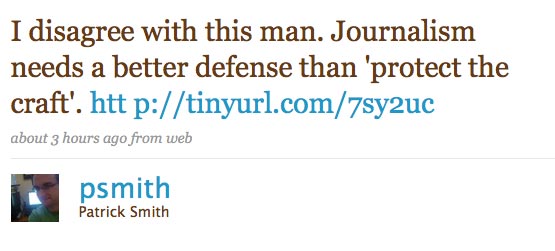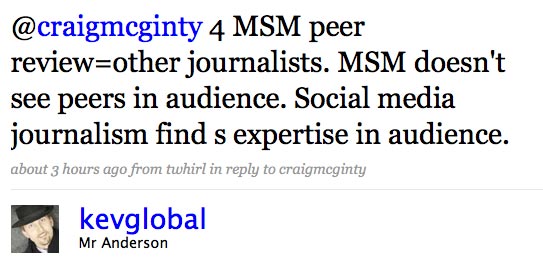Martin Belam, of the CurryBet blog, has recently been appointed as ‘information architect’ for Guardian.co.uk. Journalism.co.uk asked him what he’ll be doing for the site…
For those who don’t know what you do, fill us in your background and the new gig…
[MB] I was at the Hack Day that the Guardian’s technology department ran back in November 2008, and the talent and enthusiasm that day really shone. I’ve really enjoyed the freedom of working as a consultant over the last three years, much of the time based either in Crete or in Austria, but the opportunity of coming to work more permanently for an organisation as forward-thinking as the Guardian is being with initiatives like the Open Platform was too much to resist.
So, an ‘information architect’ what does that mean and what are you doing?
Information Architecture has been defined as ‘the emerging art and science of organising large-scale websites’.
All websites have an inherent information structure – the navigation, the contextual links on a page, whether there are tags describing content and so forth. It is about how people navigate and way-find their way through the information presented on a site.
What I’ll be doing at the Guardian is influencing that structure and functionality as new digital products are developed. It involves working closely with design and editorial teams to produce ‘wireframes’, the blueprints of web design, and also involves being an advocate for the end user – carrying out lots of usability and prototype testing as ideas are developed.
Is it a full-time role?
I’m working four days a week at The Guardian, as I still have some other commitments – for example as contributing editor for FUMSI magazine – although already it feels a bit like cramming a full-time job into just 80 per cent of the time!
It’s not happy times for mainstream media brands: where are they going wrong?
I don’t think it is only mainstream media brands that are suffering from the disruption caused by digital transition, but we do see a lot of focus on this issue for print businesses at the moment. I think one of the things that strikes me, having worked at several big media companies now, including the BBC and Sony, is that you would never set these organisations up in this way in the digital era if you were doing it from scratch.
One of the things that appealed most about joining the Guardian was that the move to Kings Place has brought together the print, online and technical operations in a way that wasn’t physically possible before in the old offices. I’m still very optimistic that there are real opportunities out there for the big media brands that can get their business structures right for the 21st century.
What kind of things do you think could re-enthuse UK readers for their newspapers?
I think our core and loyal readers are still enthusiastic about their papers, but that as an industry we have to face the fact that there is an over-supply of news in the UK, and a lot of it – whether it is on the radio, TV, web or thrust into your hand as a freebie – is effectively free at the point of delivery. I think the future will see media companies who concentrate on playing to their strengths benefit from better serving a narrower target audience.
Do you see print becoming the by rather than primary product for the Guardian – or has that already happened?
I think there might very well be a ‘sweet spot’ in the future where the display quality on network-enabled mobile devices and the ubiquity of data through-the-air means that the newspaper can be delivered primarily in that way, but I don’t see the Guardian’s presses stopping anytime soon. Paper is still a very portable format, and it never loses connection or runs out of batteries.
Your background is in computer programming rather than journalism, will the two increasingly overlap?
I grew up in the generation that had BBC Micros and ZX Spectrums at home, so I used to program a lot as a child, but my degree was actually in History, which in itself is a very journalistic calling. I specialised in the Crusades and the Byzantine Empire, which is all about piecing together evidence from a range of sources of varying degrees of reliability, and synthesizing a coherent narrative and story from there. And, of course, I’ve spent most of this decade blogging, which utilises ‘some’ of the journalist’s skill-set ‘some’ of the time.
Whilst I’d never suggest that journalists need to learn computer programming much beyond a smattering of HTML, I think there is something to be gained from understanding the software engineering mindset. There are a lot of tools and techniques that can really help journalists plough through data to get at the heart of a story, or to use visualisation tools to help tell that story to their audience.
One of the most interesting things about working at the Guardian is the opportunity to work alongside people like Kevin Anderson, Charles Arthur and Simon Willison, who I think really represent that blending of the technical and journalistic cultures.
You’ve spoken out about press regulation before; why do you feel strongly about it?
In a converged media landscape, it seems odd that Robert Peston’s blog is regulated by the BBC Trust, Jon Snow’s blog is regulated by Ofcom, and Roy Greenslade’s blog is regulated by the PCC.
At the moment, I believe that the system works very well for editors, and very well for the ‘great and the good’ who can afford lawyers, but does absolutely nothing for newspaper consumers. If I see something that offends me on TV, I can complain to Ofcom. If I see an advert that offends me in the street, I can complain to ASA. If I see an article in a newspaper that I think is wrong, inaccurate, in bad taste or offensive, unless I am directly involved in the story myself, the PCC dismisses my complaint out of hand without investigating it.
I don’t think that position is sustainable.
The last thing I want to see is some kind of state-sponsored Ofpress quango, which is why I think it is so important that our industry gets self-regulation right – and why I believe that a review of how the PCC works in the digital era is long overdue.

